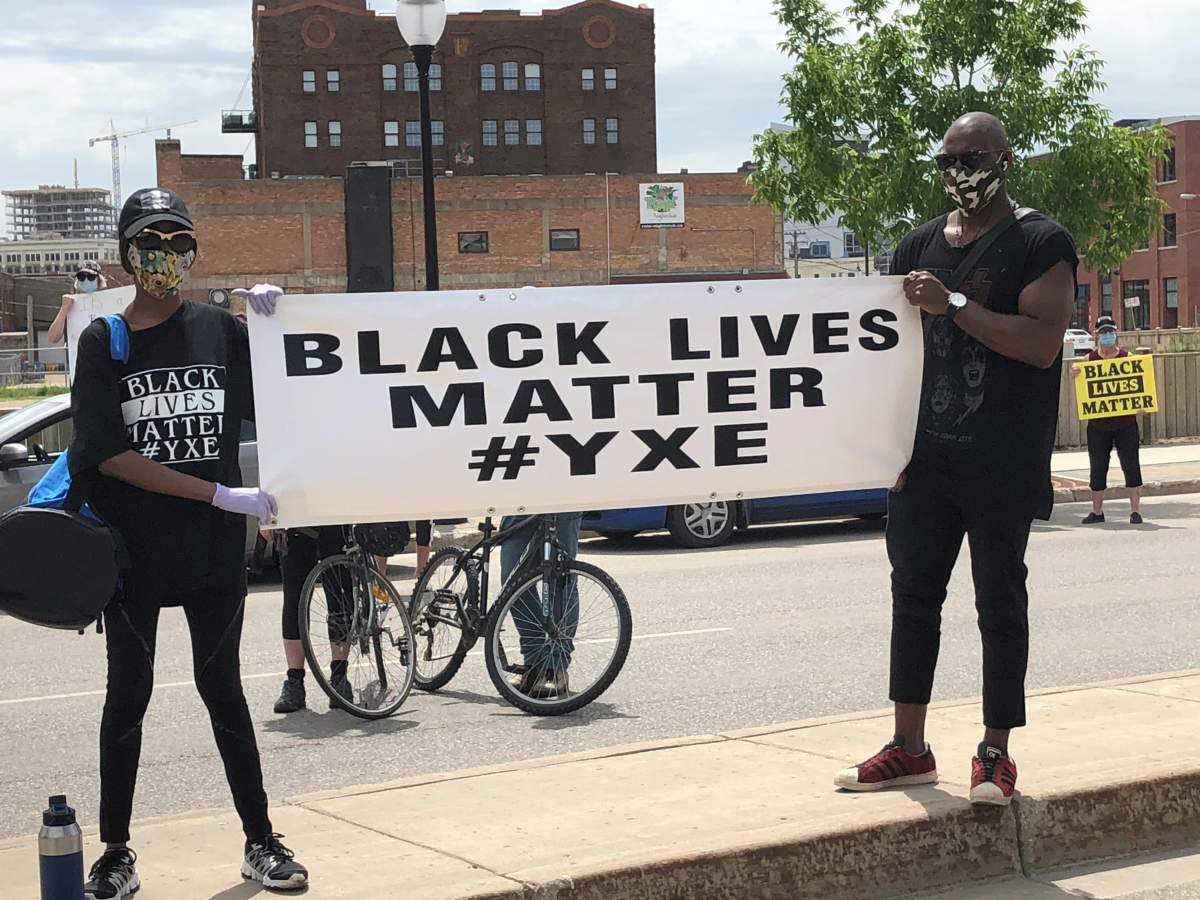One thousand people marched through downtown Saskatoon on Saturday in solidarity with the Black Lives Matter movement.

The demonstration began at noon in Kiwanis Park with speeches by organizers, guest speakers and the singing of “Lift Every Voice and Sing”.
“I’m not free while any other woman is unfree, even when her shackles are very different from my own. And I’m not free as long as one person of colour remains chained,” said Natalya Mason, quoting poet Audre Lorde.
It was the third demonstration in Saskatoon and just one of many that have taken place around the world since George Floyd, a Black man, died when a white police officer knelt on his neck for almost nine minutes.
Several speakers, including Mason, led the crowd in saying the names of people who have died in police incidents, like Breonna Taylor and Regis Korchinski-Paquet.
Many people in the crowd wore shirts or held signs that said “Black Lives Matter” and “Indigenous Lives Matter”.
Organizers, a group called Black Lives Matter YXE, told Global News they would only speak to the media after the event finished. The march concluded after the deadline and no interview was possible.
A Facebook event post described it as a “peaceful rally and march to stand in solidarity with the global Black Lives Matter movement.”
It also asked participants to wear personal protective equipment.

Get daily National news
The march travelled from Kiwanis Park to the headquarters of the Saskatoon Police Service.
A truck, with a microphone and speakers on the back, enabled those giving speeches to lead the crowd in chanting “Black Lives Matter.”
One speaker, who organizers only named as “Justice”, demanded the police, in Saskatoon and in Canada, be held accountable for the Indigenous women and girls who have gone missing or been murdered in the country and for Starlight Tours — when police would pick up people in their vehicles in the winter, drive them outside of town and leave them.
- More than half of small businesses say U.S. no longer reliable: CFIB data
- The Bank of Canada says these are the 3 warning signs for mortgage default
- Carney says Canadian military participation in Middle East war can’t be ruled out
- Canadians want floor-crossing MPs to face ‘immediate’ byelections: poll
“How many of you know people like George Floyd? How many of you know people who are going about their daily lives and they are stopped because… their skin is seen as a problem to be dealt with?” said one organizer.
“I’ve lived my whole life in the United States of America and I’ve never experienced the racism and the violence that I’ve experienced here in Saskatoon,” she added.
Tunde Basharon said he had faced racism his entire life.
“I’ve always felt helpless against it. So now that I have a chance to do something about it, why wouldn’t I?” he said.
“Sometimes it’s hard walking down the street just because you see the awkward glances, you see the awkward stares. Sometimes you go into a store (and) it’s very awkward (because) you can see the people are clearly staring at you.
He said he hoped the marches would help people understand that everyone deserves to be equally treated.
“As a child, you never really think of race, or you never really think of a person as a different colour — you think of that person as just being another person,” he told Global News.
“If, somehow, everybody can connect to those roots and see us as people rather than our skin colour then I think everything… could definitely be better.”
Next, the march walked to city hall, where some speakers spoke about racism in the education system.
Nisa Bano said she took part in the march to learn about the issues and support those suffering from racism.
“Anywhere there is injustice happening we have to make sure that we all are standing against it together,” she said.
“Just because we don’t face (racism) ourselves or we don’t hear about it doesn’t mean that it doesn’t exist.
Ahead of the event the organizers said in a Facebook post the Saskatoon police weren’t welcome to participate.
Officers directed traffic, tweeted out crowd size and road closures as they happened and largely kept their distance.
A watch commander told Global News no one was arrested and no property was damaged.
The sole confrontation was verbal — an organizer directed traffic to leave — and only lasted a few minutes.










Comments
Want to discuss? Please read our Commenting Policy first.